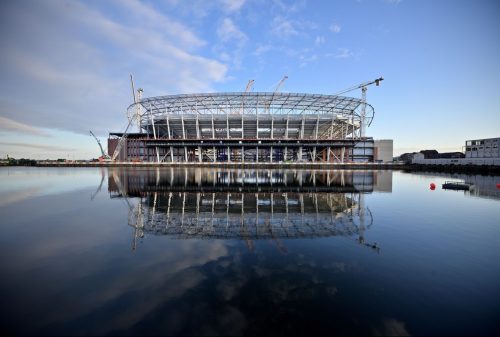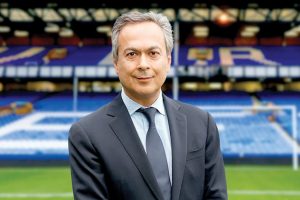Boardroom turmoil taking its toll at fallen giant of the English game

Of the region’s four Premier League sides, only Everton fans will enter the 2024-25 season with fears, not only for their final league position this term, but also existential concerns as one takeover bid after another for the Blues has unceremoniously foundered.
A managerial merry-go-round has succeeded in assembling a Frankenstein squad, reflecting the ambitions of each failed coach.
This led to serial relegation scraps in the dying embers of each Premier League season recently.
Last season, current manager Sean Dyche managed to avoid final day palpitations, similar to the previous campaign, when Everton hit an uncharacteristic purple patch, adding wins and precious points to declare themselves mathematically safe from the drop to the dreaded Championship with plenty of time to spare.
Transfer dealings at Goodison Park, so far, augur well, mostly, despite a paucity of pre-season friendly successes.
But it is the constant off-field uncertainty that threatens to destabilise any good work emerging on the playing side.
Many fans genuinely feared the club could fall into administration following the official close of the 2023-24 season, bringing with it yet another points deduction and all the chaos that would ensue, such was the parlous financial state Everton has found itself in, with an owner apparently unwilling to invest any more, and the bill for the new £760m Bramley-Moore Dock stadium hovering like a spectre at the feast.
The Blues have suffered two points deductions, so far, for breaching the Premier League’s PSR (Profit and Sustainability Rules) code.
First, the Premier League imposed a 10-point deduction last November, which was later reduced to six points following an appeal in February.
Then, in April, the league imposed a further two-point deduction, which the club decided not to appeal.
It could face further action in the form of a points deduction linked to interest costs associated with the building of the stadium, but no date has been set, so far, for a hearing into the matter.
It appears the Toffees have escaped further points sanctions, scraping under the PSR limit by the end of June, after bolstering the accounts with astute transfer dealings.
But the long term future of the club is still far from settled.

Farhad Moshiri
Farhad Moshiri, the British-Iranian businessman who holds 94.1% of the club, officially put it on the block in September last year when he declared Miami-based 777 Partners as his preferred buyer.
Thus began a farcical on-off series of potential deals that have left Moshiri abandoned at the altar once more, following failed bids by 777 Partners, Maciek Kaminski, MSP Sports Capital, and, most recently, the Friedkin Group.
This most recent approach, by renowned US billionaire businessman and film producer, Daniel Friedkin offered the greatest hope to long-suffering Evertonians.
As the current owner of Serie A side, AS Roma, hopes were raised when he began due diligence of the Goodison accounts.
But he was scared off by the fall-out of 777s disastrous business plan which has resulted in legal action in the US courts after the company and its co-owner, Josh Wander, were accused of a “fraudulent scheme” by a lender in a civil court filing in New York.
This is an ongoing case, and the Friedkin Group could not be sure how long it would last, or who was in charge of a loan made by 777 to Everton, which posed a severe potential risk, resulting in Friedkin walking away last month.
And, until resolved, the very same issue will pose a stumbling block for any successive takeover bids.
In the meantime, Everton’s debts have soared to more than £500m.
This is on top of a sixth successive year of losses at the club – the sixth most successful in the English game in terms of honours, including nine league titles, even ahead of current champions Manchester City.
The latest financial figures for 2022-23, revealed a pre-tax loss of £89.1m, up from a restated £38.3m in 2021/22.
This means the club has made losses for the past six years – in 2017/18 a £131.1m loss, 2018/19 £111.8m loss, 2019/20 £139.8m loss, 2020/21 £121m loss, 2021.22 £38.3m loss and this year’s £89.1m loss.
Turnover fell from £181m in the previous year to £172.2m in 2022-23.
The loss was mainly due to the fall in turnover, a fall in player and management trading, and an increase in operating costs.

Gate receipts rose from £15.6m to £17.3m, driven by season ticket sales.
However, sponsorship income fell for the third season, from £35m to £19.2m, mainly related to former USM deals.
Costs rose from £205.5m to £213.1m, including £7.1m in payments to former manager Frank Lampard and his team following their dismissal. In the 2021/22 figures the club paid former manager Rafa Benitez and his team compensation of £10.5m.
While the emphasis should clearly have been on stripping out as much costs as possible to reduce losses, overall staff headcount actually rose, from 491 staff to 532.
The wage/turnover ratio also increased, from 90% the previous year, to 92%, substantially higher than the 70% level considered sustainable for the Premier League.
Construction costs relating to the club’s new stadium for the 2022/23 year were £210.9m, up from £207m in 2021/22.
The club’s net debt position increased to £330.6m because of significant investment in the Everton Stadium project. This has increased following working capital loans from 777 Partners and the Friedkin Group.
In their report, the auditors, once again, highlighted “the existence of a material uncertainty that may cast significant doubt about the group’s ability to continue as a going concern”, which only highlights, even more, the desperate need at Everton for new owners who can offer stability and support.







